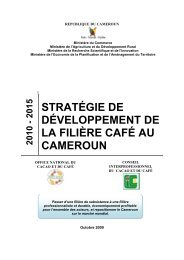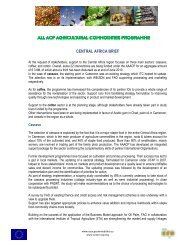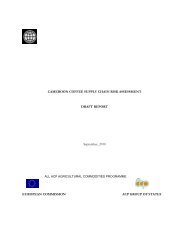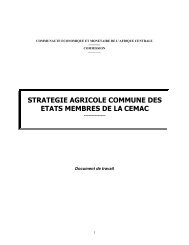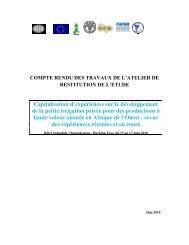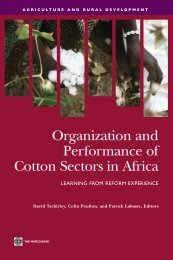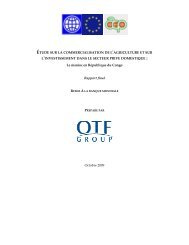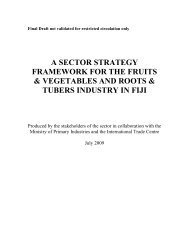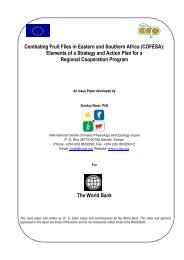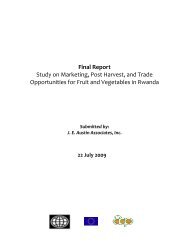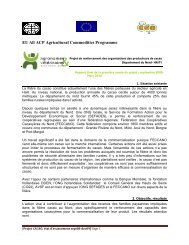Constraints to smallholders participation in Cassava value ... - aaacp
Constraints to smallholders participation in Cassava value ... - aaacp
Constraints to smallholders participation in Cassava value ... - aaacp
You also want an ePaper? Increase the reach of your titles
YUMPU automatically turns print PDFs into web optimized ePapers that Google loves.
cases of viable and susta<strong>in</strong>able bus<strong>in</strong>ess organisations. Experience shows that there is no s<strong>in</strong>glesuccess fac<strong>to</strong>r, model or process <strong>to</strong> create susta<strong>in</strong>able producer organisations: there is no ‘one-sizefits-all’.Successful organisations may be new <strong>in</strong>itiatives or be based on pre-exist<strong>in</strong>g organisations.They may be external or grassroots <strong>in</strong>itiatives. To grow <strong>in</strong> scale and organisational complexity,external resources are usually required. The development path is often uneven, sometimes withfailure and rebirth from the ashes of <strong>in</strong>competence, corruption and bad luck: ‘phoenix’ organisations(Kachule, R., Poole, N.D. and Dorward, A. 2005; Donovan, J., S<strong>to</strong>ian, D. and Poole, N.D. 2008; Poole,N.D. and de Frece, A. 2010). External donors and support organisations need <strong>to</strong> recognise thatgrowth <strong>to</strong> maturity is slow, and that accompaniment is necessary for years rather than months.KWCP is at an early stage of development but is a model that PAM is will<strong>in</strong>g <strong>to</strong> try <strong>to</strong> replicate, bu<strong>to</strong>ne which is likely <strong>to</strong> need an external <strong>in</strong>put susta<strong>in</strong>ed over some years. Donor fund<strong>in</strong>g can passthrough an NGO work<strong>in</strong>g <strong>in</strong> a specific area for <strong>in</strong>frastructure development, technical tra<strong>in</strong><strong>in</strong>g andorganisational capacity build<strong>in</strong>g. KWCP shows that it is advantageous <strong>to</strong> work with a pre-exist<strong>in</strong>gorganisation and make such organisations effective.The alternative is <strong>to</strong> set up new community organisations. While this can be effective, there are alsovarious consequences that might be negative. Sett<strong>in</strong>g up new organisations is likely <strong>to</strong> lead <strong>to</strong>duplication and confusion, wasted efforts, disempowerment of exist<strong>in</strong>g local <strong>in</strong>itiatives, lack ofcommunity ownership of new <strong>in</strong>itiatives, disillusionment, and conflict. New organisations also faceproblems of (self-)selection of new members that will tend <strong>to</strong> exclude certa<strong>in</strong> groups. The questionof target<strong>in</strong>g and (self-)selection (of members) <strong>in</strong>troduces ethical questions that development policiesdo not usually tackle. For example, it was evident from <strong>in</strong>terviews conducted <strong>in</strong> Chongwe that menfelt excluded from the KWCP <strong>in</strong>itiative. The ethical nature of such ‘positive discrim<strong>in</strong>ation’ needs <strong>to</strong>be exam<strong>in</strong>ed, just as much as biases <strong>to</strong>wards the ‘not-so-poor’.5.3 Enterprise development and moni<strong>to</strong>r<strong>in</strong>gIt is clear that the development of susta<strong>in</strong>able community or collective bus<strong>in</strong>ess organisations needssubstantial support <strong>in</strong> terms of management skills and a range of bus<strong>in</strong>ess development services, ofcoord<strong>in</strong>ation among the agencies which provide complementary services and a commitment <strong>to</strong> along-term process of learn<strong>in</strong>g by do<strong>in</strong>g.Two specific problems with producer organisations which give rise <strong>to</strong> <strong>in</strong>efficiency and collapse areweak management skills and corruption (Kachule, R. et al. 2005; Poole, N.D. and de Frece, A. 2010).On management skills, the literature notes that support<strong>in</strong>g services for collective enterprisesgenerally are provided through diverse suppliers (NGOs, government, private sec<strong>to</strong>r) andrecommends that the type and level of provision needs <strong>to</strong> be considered <strong>in</strong> relation <strong>to</strong> the stage ofdevelopment of each organisation (Donovan, J. et al. 2008). On performance and corruption, anadditional mechanism needs <strong>to</strong> be emplaced <strong>in</strong> order for organisations <strong>to</strong> be accountable <strong>to</strong> themembership and other stakeholders. In short, there needs <strong>to</strong> be an external audit<strong>in</strong>g system. Intheory the public sec<strong>to</strong>r could provide some oversight, but a solution other than through agovernment m<strong>in</strong>istry such as MACO will be preferable. The audit function <strong>to</strong> prevent fraud andcorruption <strong>in</strong> registered collective organisations could be contracted out <strong>to</strong> an ‘ombudsman’ oroffice <strong>in</strong>dependent of the m<strong>in</strong>istry, probably <strong>in</strong> the private sec<strong>to</strong>r: maybe a body of accountants andbus<strong>in</strong>ess specialists, or an NGO. The advantage of a sec<strong>to</strong>ral approach is learn<strong>in</strong>g by do<strong>in</strong>g can be20



